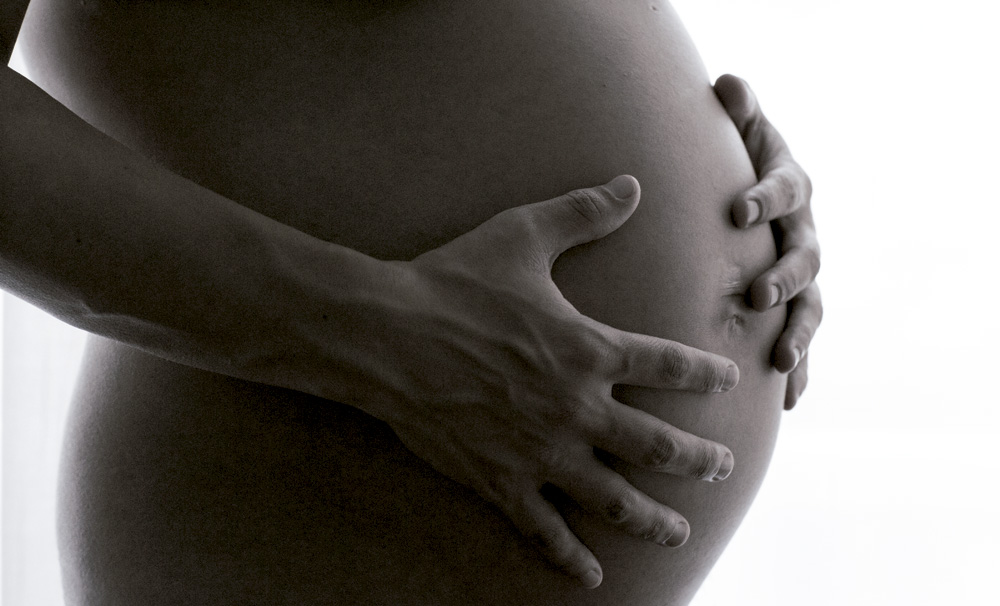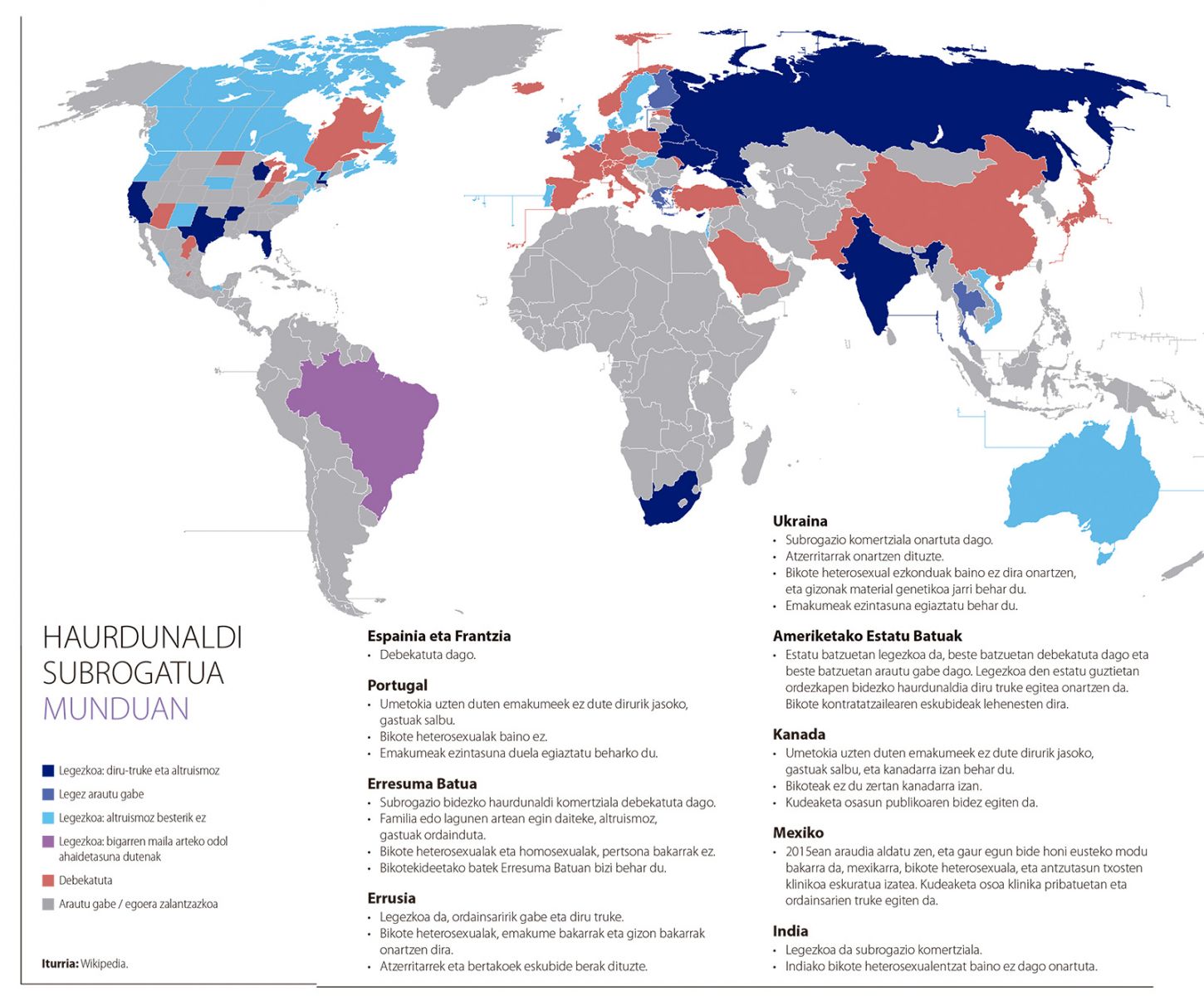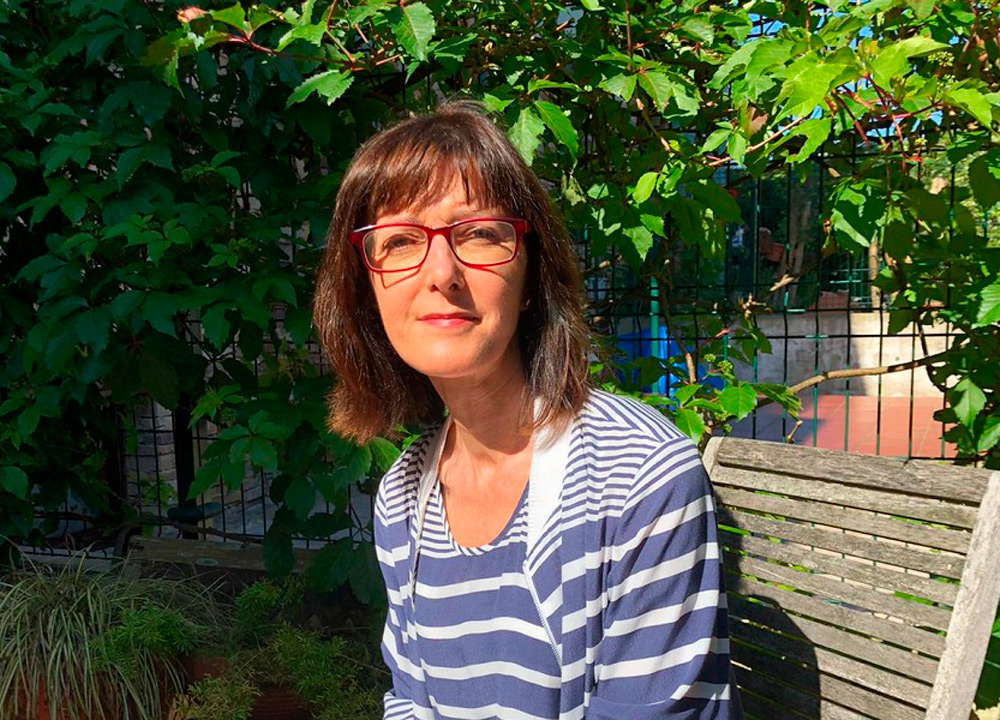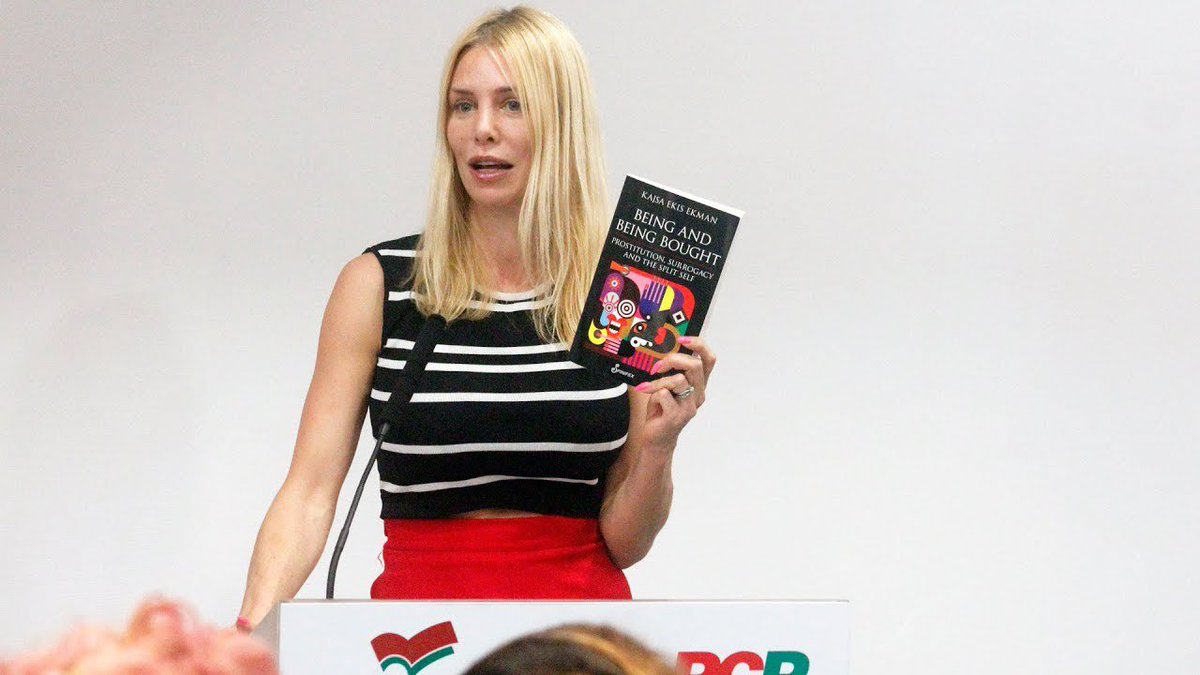Beyond itself or not
- Scientists discovered in the 1980s that a woman could give birth to a child who had not been fertilized by an egg. The issue is now on the citizens’ lips, because those around us have done so or want to do so, and above all, because there is a wide range of opinions for and against. About 250 children come every year to Euskal Herria, raised in the womb of foreign women. It is prohibited here. The debate has not been legalised or banned, it is much more complicated than that. In the report we have given the keys to understanding this complexity.

Be a parent, a desire or a right?
Does every person have the right to be a mother or a desire to be a mother? We have the right to housing, to paid work, to health services...
Who is entitled to what? Does the father have the right to have a child? What rights does the woman who has offered the uterus have? And what are the rights of the child to be born?
In the view of some, this debate is bringing the wishes up to the standards of rights and putting rights above others. The free choice to be parents has prevailed for the rest.
Right of access to resources
One thing is the desire to be a parent and another is the right to be within the reach of all existing resources for this purpose. There are several ways of being parents: adoption, foster families, egg donation and sperm donation, in vitro technique, subrogation... Are these resources available to all citizens? Do heterosexual couples, gay couples or lesbian couples, single women and single men have the same opportunities to access these resources? Are there citizens who have no more opportunities to access these resources on the basis of socio-economic level? Are those with the least economic resources not left out of the game?
Is subrogation a matter for gays?
How many heterosexual couples have appeared in the media talking about legalizing fertilization or surrogacy or teaching children brought from abroad? Haven't we heard gay couples anymore? Some voices say that the gay lobby has been at the forefront of legalizing subrogation. Other voices state that mediation companies in surrogate pregnancy have expressly brought gay couples to the front line: “They are less likely to be fathers and mothers than women, we will give them the opportunity.” Another question is why heterosexual couples who have performed or would like to perform surrogate fertilization do not publicly express their desire: it is not well seen; keeping the traditional model of parenthood, one can give the impression that they have had the child “as usual” after keeping the subrogation hidden...
According to the study, 20% of couples who have undergone surrogate gestation in Canada were men. There, subrogation is not allowed in the commercial exchange, it has to be free and the process is managed through the public health services. In 2014, the results of the study conducted between 1998 and 2012 were made public: 80% of the population that used surrogate fertilization are not male partners.
VAE and Subrogalia are the Spanish companies that carry out the task of intermediation in the subrogation. These companies have provided similar data: Between 70% and 80% of people who resort to subrogation are heterosexual couples. The rest are male partners, men alone, and fewer women.
Does a woman decide freely about her own body?
This is the woman who will have the child in her stomach for nine months. Does she not have the right to decide whether or not she wants to carry out surrogate fertilization? Who's who to tell you anything? This is an idea that has been very much emphasised between the views in favour and against subrogation. Currently, women who perform surrogate fertilization in the world do so in very different conditions and with very different socioeconomic situations. This second idea is the one that those who speak against commercial subrogation bring to the table. In other words, one thing is the right to decide on one's own body, and another is that surrogate fertilization is an extraordinary source of income. There is supply because there is demand, some say.
However, the examples are very different. In India, the poorest women are pregnant, leaving their bodies in the hands of mediation companies. They feel much better served in clinics than in their usual lives, care for (control) their health for 24 hours, and eat better than ever for nine months. They get a fortune that they wouldn't earn in years. Women are happy. However, why have you decided to go under? To pay off debts, to pay for the daughter’s studies, to buy a house, to “marry well” the daughter...
A very different example. Woman from Canada. She will have a child for a friend, without any financial benefit. Behind there are no economic reasons and the process will be managed through public health. A third example. An American woman. He won't have the altruistic baby like the Canadian, he'll charge thousands of dollars. It cannot be on the list of citizens to whom aid is granted, otherwise it would not be able to enter into treatment. Their desire is for the money to be extra in the family economy.
All three of them have come for substitution fertilization. These are, however, very different examples. To what extent has the right to decide in each case been exercised freely? To what extent has the economic need influenced the decision of women?

During pregnancy
We have talked about the right of women to surrender. Another question is, once decided, what are your rights during pregnancy and how long. When we talk about the right to decide, do we talk about the following situations? Does the pregnant woman decide to give birth or caesarean section? (In money exchange treatment, caesarean section is among the conditions: for the baby to suffer less, for the child to be more beautiful, to avoid difficulties...). Will the pregnant woman have the right to receive the baby when she is born? (In Canada and in several European countries they already have the opportunity to do so). What will happen if the applicant has asked for a child and if two come? In case the child comes with a disease, who is responsible? Will the child know who was pregnant or not be given this information?
In the light of international examples, in general, it can be said that the more commercial treatment is and the more mediation companies, the less rights the pregnant woman has. On the contrary, in cases of altruistic abuse and where there is a determined intervention from public institutions, the pregnant woman has a greater right to decide during pregnancy.
Widening the range of family models
There are more and more ways to shape families. Substitution fertilization is not the only topic of debate and will not be the last. Instead of analyzing and regulating in their loneliness, it requires a review of the whole context. Consideration should be given to how adoption is regulated, who has the right and the capacity to adopt, what rights the adopted child has. There are also foster families. In public and private hospitals, in vitro fertilization techniques are performed; egg and sperm donations are performed. If outside the health system a woman uses a friend's sperm to get pregnant, it's not regulated. A legal umbrella is needed for the opportunities that exist and for those that will come.
Will heteronorma be overcome?
You only have to look at the examples below the map. There are many ways to regulate surrogate fertilization. In some states only heterosexual couples are accepted; in others, heterosexual and homosexual couples; in others, couples of both sexes, single women and men unicos.Este debate allows to talk about heteronorma and overcome it. The same exercise can be carried out in other family composition options; who is entitled to adoption, who can benefit from egg and sperm donations, etc.
Because here you can't, people go overseas.
The Basques are subject to the laws of the Spanish and French states. These laws say that surrogate pregnancy is prohibited. Those who need a uterus leave. The proponents of the regulation here say that the ban obliges people to travel abroad and that in some states the rights of pregnant women and children are not respected. They say that if a system of strict conditions and no economic income were to be implemented here, pregnant women and children would be protected. Another thing is that there would be enough women willing to leave the womb to meet all the demands of the Basque Country. 250 children arrive in Euskal Herria who have been received year after year by subrogation. In 2016, in the Spanish state (47 million inhabitants), more than 800 people went abroad for surrogate fertilization, and in Canada (35 million inhabitants), altruistically, every year so many other women offer their womb.
On the other hand, both the French and Spanish States have objected to the registration of children born abroad until yesterday. Today, both States have legalized in some way and allow children to be registered.
Comparisons are inevitable
Prostitution is a constant in the debate on surrogate fertilization. Both use the female body. Should anyone who advocates the legalization of prostitution have a favorable attitude towards commercial subrogation? Are they free who, like prostitutes, offer their womb to use their bodies to their liking? Why if one is a job, the other is not?
Rather than answers, we have asked questions in the article, trying to blow some of the ends of the issue, to serve as a debate.
Many Basque feminists have been disappointed to learn that writer Chimamanda Ngozi Adichie has externalized pregnancy, meaning that a surrogate has fertilized her baby for money.Adichie is the author of the essay We should all be feminists, among others. They have ignored the... [+]
Buy a jersey, pants, shoes, car, home, couch, a big TV and a warm blanket on the couch so you can enjoy the big TV. Buy a pack of doritos, beers and pizza that you'll share with your friends.
Buy. Buy your successor. Buy what your child will be. Buy the body of your... [+]




















